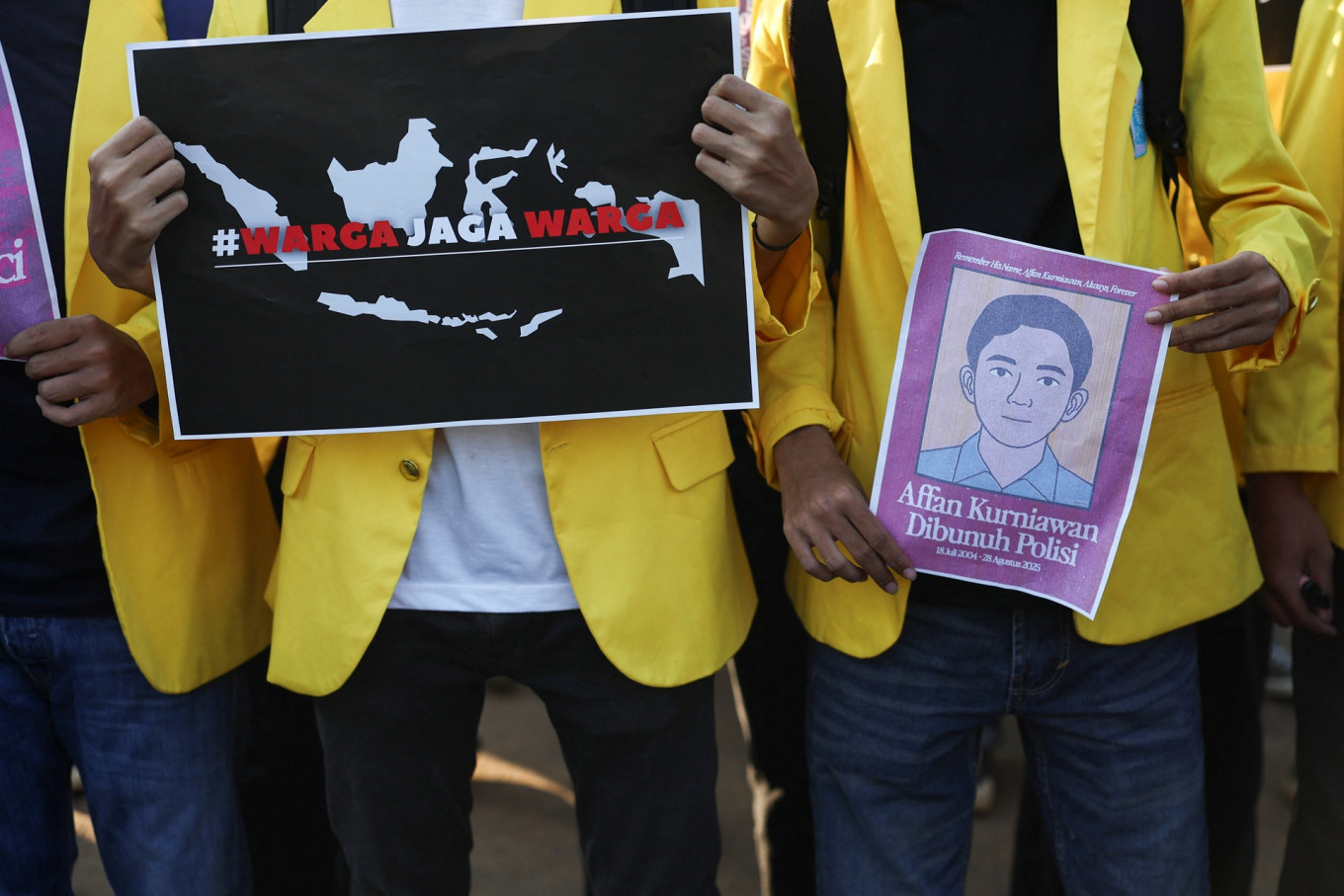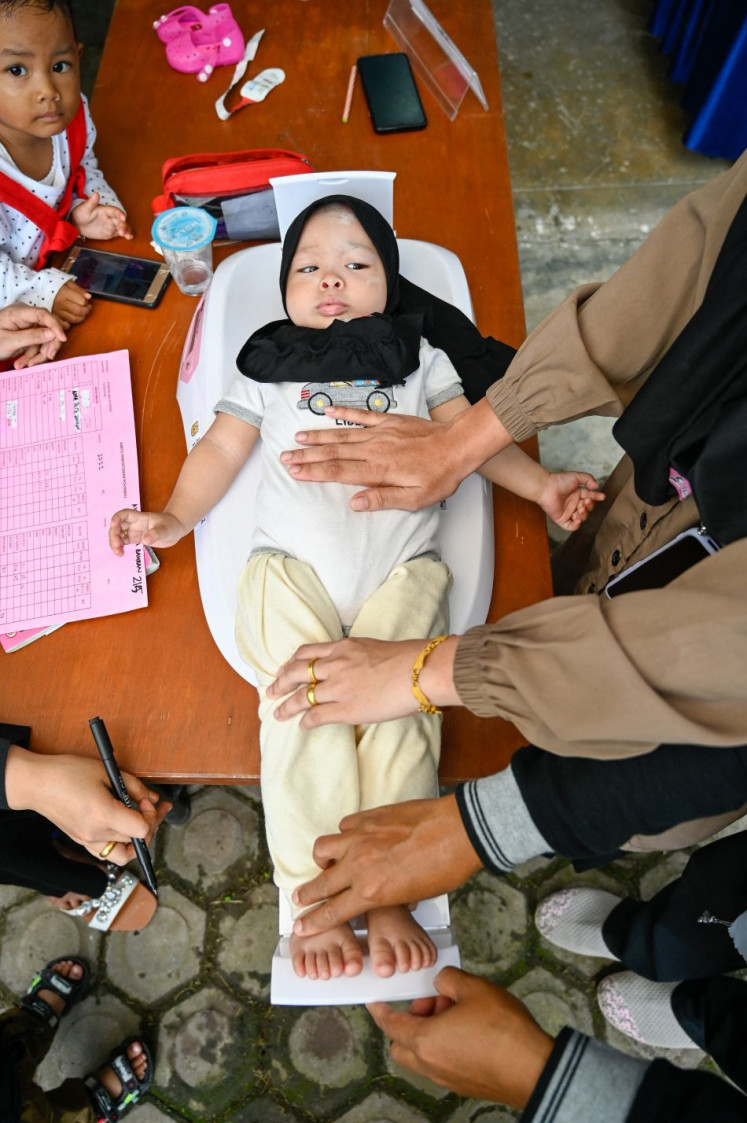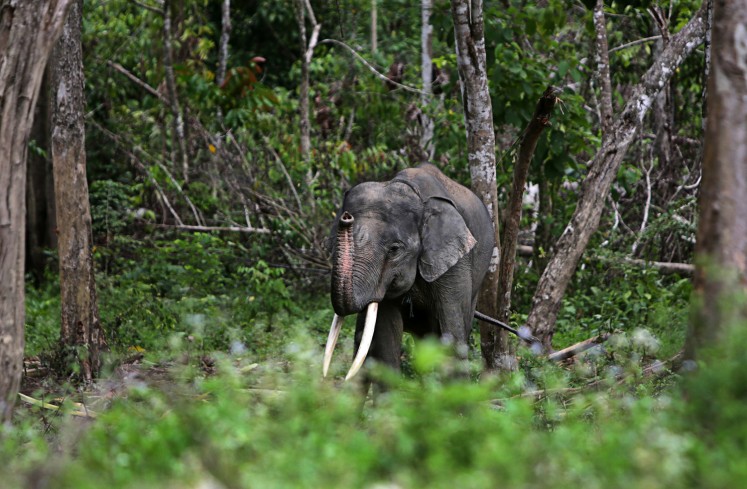Popular Reads
Top Results
Can't find what you're looking for?
View all search resultsPopular Reads
Top Results
Can't find what you're looking for?
View all search resultsState response to protests echoes darker times
Though the recent protests evoked a darker chapter in the nation’s history, they also mark a departure, and the question is whether the state response will, too.
Change text size
Gift Premium Articles
to Anyone
 University students hold posters during a rally outside the Senayan legislative complex in Jakarta on Sept. 4, 2025, one bearing the hashtag #WargaJagaWarga (left), or “citizens protecting citizens”, the other an illustration of Affan Kurniawan, the 21-year-old ‘ojol’ (online motorcycle transportation) driver who was killed on Aug. 28 by a vehicle of the Jakarta Police Mobile Brigade (Brimob). (Reuters/Willy Kurniawan)
University students hold posters during a rally outside the Senayan legislative complex in Jakarta on Sept. 4, 2025, one bearing the hashtag #WargaJagaWarga (left), or “citizens protecting citizens”, the other an illustration of Affan Kurniawan, the 21-year-old ‘ojol’ (online motorcycle transportation) driver who was killed on Aug. 28 by a vehicle of the Jakarta Police Mobile Brigade (Brimob). (Reuters/Willy Kurniawan)
I
ndonesians have taken to the streets over the past week to protest against elite corruption. The demonstrations began peacefully on Aug. 25 with protests outside the House of Representatives in Jakarta. They soon spread across the country.
The so-called Revolusi Rakyat Indonesia (Indonesian people’s revolution), a movement at the center of the Aug. 25 demonstrations, is demanding an investigation into corruption allegations involving the family of former president Joko “Jokowi” Widodo. Jokowi has strongly rejected these accusations, painting them as a smear campaign.
Protesters are also calling for the dissolution of the legislature and the impeachment of Vice President Gibran Rakabuming Raka, Jokowi’s son.
Gibran’s path to the vice presidency was controversial. In Indonesia, presidential and vice presidential candidates must be at least 40 years old, yet he was only 36 during the 2024 election. The Constitutional Court, led by Gibran’s uncle Anwar Usman, changed the rules to grant an exception for regional leaders. Usman was dismissed from his post by an ethics council less than a month later.
The protesters’ demands resonate with wider public anger over the gulf between privilege and poverty in the country. Lawmakers pocket high salaries while millions of workers scrape by on some of the lowest minimum wages in the world. News in mid-August that House members had secured another pay rise only added fuel to the fire.
The protests later erupted into violence in several regions. The trigger for this came on Aug. 28, when an armored police vehicle struck and killed an ojol (online motorcycle transportation) driver in Jakarta before fleeing the scene. National Police chief Gen. Listyo Sigit Prabowo issued an apology to the victim’s family and has confirmed the case is being investigated.
President Prabowo Subianto initially denounced demonstrators as “traitors” and “terrorists”, vowing decisive action against them. But he later backtracked, pledging on Aug. 31 to heed public demands and even cut lawmakers’ allowances.
In the days leading up to this abrupt reversal, echoes of a darker chapter in the nation’s history resurfaced: one marked by state-led violence and intimidation, the mobilization of Islamist groups and the scapegoating of minorities.
Indonesia prides itself on Bhinneka Tunggal Ika, unity in diversity. But Prabowo has long relied on conservative Islamist groups to strengthen his power, push through hard-line policies and help silence dissent. This includes the Islam Defenders Front (FPI), which the Jokowi administration banned in 2020.
Back in 2014, when Jokowi and Prabowo contested the presidential election, Islamist hard-liners perpetrated smear campaigns against Jokowi, accusing him of being a communist agent. They also orchestrated the mass mobilization that toppled Jakarta’s ethnic Chinese Christian governor, Basuki Tjahaja Purnama, in 2017.
The alliance cooled after Prabowo entered Jokowi’s coalition at the end of 2019, but has been seemingly revived amid the recent protests. On Aug. 30, the President summoned 16 Islamic organizations to his private residence, reportedly urging them to work with the government to “safeguard security and peace”.
Meanwhile, racist threats targeting Chinese-Indonesian women have flooded online platforms. Popular content creator Elsa Novia Sena, among others, has received rape threats from an account using the handle @endonesaatanpacinak (Indonesia without Chinese). I, too, received rape threats online after criticizing the government on X.
For many in Indonesia’s Chinese minority, the atmosphere is chillingly reminiscent of May 1998. That month saw hundreds of women brutally raped, some with sharp tools, in riots characterized by widespread looting and killing. Human rights activists say the 1998 riots were orchestrated or exacerbated by the military to divert public attention from anti-government demonstrations.
Prabowo, an Army general at the time, is suspected of being involved in human rights violations during the 1998 riots. He has rejected his alleged involvement in any acts of violence, but was discharged from the military over the allegations and banned from entering the United States for two decades.
During the blackouts on Aug. 31 in parts of Jakarta (which also occurred prior to the 1998 riots), looting broke out. Yet in my opinion, something feels different this time. Protesters deliberately targeted the homes of House members accused of sneering at the public after securing a pay rise.
The house of Finance Minister Sri Mulyani was also attacked. She is seen by many as complicit in imposing draconian tax policies on ordinary people while sparing elite lawmakers. The minister has dismissed the accusation, saying that any laws are passed in an “open and transparent manner”.
No Chinese-Indonesians have been attacked so far. A new slogan, “people looking after people”, has circulated on social media. Many insist the old trick of scapegoating the Chinese minority no longer works.
In May 1998, public anger against then-president Soeharto was driven by an economic crash. The ethnic Chinese population, seen as disproportionately successful in business, became convenient scapegoats. This time, however, many people have turned against the military.
The protests are no longer only about economic grievances or corruption; they seem to be a stand against the authoritarian playbook of divide and rule. Many even suspect that some of the looters in the current demonstrations are soldiers in disguise.
In the East Java capital of Surabaya, suspicions deepened when several police posts were torched. People online pointed out that the arsonist, caught in a viral photo, wore an outdated ojol uniform paired with Adidas Terrex shoes worth millions of rupiah. The caption asked: “Why would [a driver] wear a uniform no longer in circulation and, if he really were one, how could he possibly afford such shoes?”
Prabowo might not have anticipated such a reaction from the people, forcing him into a U-turn. But despite his gestures of appeasement, many remain unconvinced, dismissing his offers as merely cosmetic.
That skepticism appeared vindicated almost immediately. Late on Sept. 1, the Islamic University of Bandung and Pasundan University came under attack as security forces fired tear gas and rubber bullets at student protesters.
The mass protests, which have spread to 32 provinces, are unlikely to subside soon. The question is whether the government can still weaponize fear and prejudice to cling to power, or whether ordinary Indonesians will stand firm and united against corruption and state violence in demanding justice.
---
The writer is a senior lecturer in the School of Languages, Cultures and Linguistics at the School of Oriental and African Studies (SOAS), University of London. This article is republished under a Creative Commons license.










